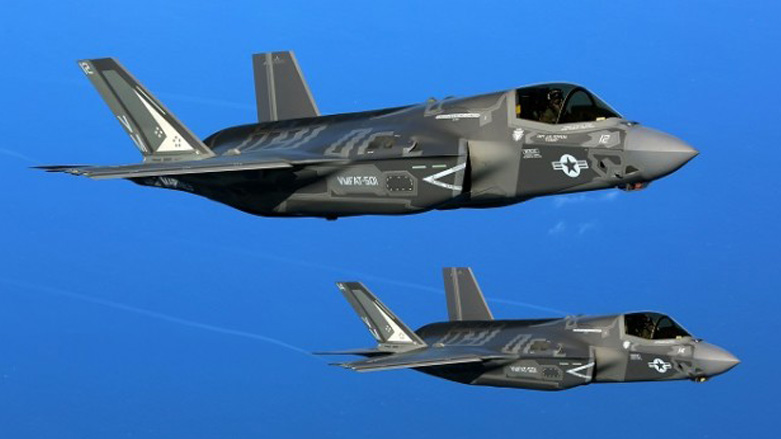US: Turkey will not get F-35, sanctions under consideration

WASHINGTON DC (Kurdistan 24) — President Donald Trump said on Tuesday that Turkey will not get the F-35, America’s newest fighter jet, while State Department Spokesperson Morgan Ortagus explained that the administration was still reviewing what sanctions would be imposed on Turkey for its acquisition of the S-400, Russia’s most advanced air defense system.
A 2017 US law, entitled Combatting America’s Enemies Through Sanctions Act (CAATSA), includes, among its provisions, a requirement that the US impose sanctions on countries doing business with Russia’s military and intelligence agencies.
CAATSA provides a menu of 12 options for sanctions. President Trump and the Secretary of State “will make a decision” based on those options as to what penalties to impose and do “what they’re required to do, according to US law,” Ortagus stated.
Turkey first announced on Friday that it had begun to receive the S-400 from Russia, but it was not until Tuesday that US officials started to spell out the consequences—although they had long warned Ankara of serious consequences if it took delivery of the Russian weapons system.
READ MORE: Russian missiles start arriving in Turkey, amid disjointed US response
Dr. Mark Esper, Secretary of the Army, has been nominated to become Secretary of Defense, and he testified on Tuesday morning before the Senate Armed Services Committee in the confirmation hearing for his new post.
In his hearing, Esper became the first administration official since Russia’s delivery of the S-400 began to state publicly one consequence of Turkey’s acquiring the missile system.
As Esper informed the committee, he had told Turkey’s Defense Minister, “You can either have the S-400 or you can have the F-35,” but “you cannot have both,” as “acquisition of the S-400 fundamentally undermines the capabilities of the F-35.”
US officials have firmly, and repeatedly, stated that with the S-400 in Turkey, allowing the F-35 there would endanger the US aircraft, as the Russian military would gather information to enable it to better track and shoot down the plane.
Esper also noted a broader shift in Ankara’s policy. “It is very disheartening to see how they have drifted” away from the US “over the past several years,” he told the Senate committee.
Anonymously, Defense Department officials have expressed even greater concern. “To the minds of Pentagon strategists, the S-400 deal is part of [Putin’s] plan to divide NATO,” The New York Times reported on Friday. “American officials are clearly uneasy when asked about the future of the alliance, or even how Turkey could remain an active member of NATO while using Russian-made air defenses.”
Last month, Reuters reported that other US allies, including Iraq, Qatar, Saudi Arabia, Egypt, and India, are all considering acquiring the S-400 as well.
Shortly after Esper made his remarks, Trump spoke at a cabinet meeting. While he repeated that Turkey would not get the F-35, he struck a very different tone about broader US relations with Turkey.
Trump’s statement on Tuesday was similar to his remarks in Japan, after his June 29 meeting with Turkish President Recep Tayyip Erdogan. In Japan, Trump blamed the Obama administration for its unwillingness to sell America’s Patriot air defense system to Turkey, obliging Erdogan to turn to Russia. “He got treated very unfairly,” Trump said then.
On Tuesday, Trump affirmed his “very good relationship” with Erdogan, adding “we have a situation where Turkey is very good with us” and “we are now telling Turkey that, because you have really been forced to buy another missile system, we’re not going to sell you the F-35 fighter jets.”
“It’s a very tough situation that they’re in,” Trump continued. He also noted the economic loss to the US. “I would say that Lockheed,” the principle manufacturer of the aircraft, “isn’t exactly happy. That’s a lot of jobs.”
A former Pentagon official, however, expressed his concern to Kurdistan 24. “If Trump is not tough enough on Turkey, other countries may be tempted to follow suit” and purchase the S-400 themselves. “That would be a particular risk,” he noted, “if Russia is deliberately using the S-400 to disrupt America’s military alliances.”
Separately, there is also a dispute between Turkey, on the one hand, and the European Union (EU) and the US, on the other, over Turkey’s oil and gas drilling in waters claimed by Cyprus.
On Monday, the EU announced that it was imposing several, limited sanctions on Turkey.
READ MORE: EU imposes economic penalties on Turkey for drilling in Eastern Mediterranean
On Tuesday, Ortagus expressed Washington’s support for the EU position, as she noted that the US has “expressed deep concern over Turkey’s assertions that it is going to continue to drill in these waters off Cyprus.”
Earlier on Tuesday, Turkish Foreign Minister Mevlut Cavusoglu dismissed the new EU measures. There is “no need to take the decision seriously,” because “they know it’s impossible to implement,” he said.
Cavusoglu further affirmed that Turkey would continue its drilling activities, and it would even send another ship to drill in the contested waters.
Editing by Nadia Riva
